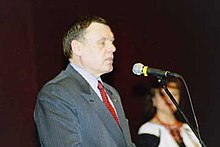Kostyantyn Morozov
Kostyantyn Morozov | |
|---|---|
Костянтин Морозов | |
 Morozov in 2003 | |
| Ukrainian Ambassador to NATO | |
| In office 4 November 2005 – 15 October 2007 | |
| President | Viktor Yushchenko |
| Preceded by | Volodymyr Khandohiy |
| Succeeded by | Ihor Sahach |
| Ukrainian Ambassador to Iran | |
| In office 4 April 2000 – 15 June 2001 | |
| President | Leonid Kuchma |
| Preceded by | Volodymyr Butyaha |
| Succeeded by | Vadim Primachenko |
| 1st Minister of Defence | |
| In office 4 March 1991 – 4 October 1993 | |
| President | Leonid Kravchuk |
| Preceded by | Office established |
| Succeeded by | Ivan Bizhan (Acting) |
| Personal details | |
| Born | 3 June 1944 Lozova Pavlivka, Ukrainian SSR, Soviet Union |
| Awards | |
| Military service | |
| Allegiance | |
| Branch/service | Soviet Air Forces Ukrainian Armed Forces |
| Years of service | 1967–1993 |
| Rank | Colonel general |
Kostyantyn Petrovych Morozov[a] (born 3 June 1944) is a Soviet-Ukrainian former military officer who served as the first Minister of Defence of Ukraine following its 1991 declaration of independence. Morozov also briefly served as Ukraine's ambassador to Iran in 2005 and as ambassador to NATO from 2005 to 2007. In his latter office, Morozov was a key figure in establishing Ukraine's policy of seeking to join NATO.
Biography
Kostyantyn Morozov was born in a village of Lozova Pavlivka (today part of Brianka, in Luhansk Oblast) on 3 June 1944. His father, Petro Stepanovych Morozov, was an ethnically-Russian mine electrician, and his mother was an ethnically-Ukrainian school teacher. Petro Stepanovych died on the job when Kostyantyn was around 10 years old.
Morozov graduated from the Hrytsevych Higher Military Aviation College for the Air Force pilots in Kharkiv in 1967, after which he served in the Soviet Air Forces' Northern Group. In 1975, Morozov graduated the Gagarin Military-Air Academy. Afterwards, Morozov held a number of commanding position across the Soviet Union. From 1984 to 1986, he studied at and graduated from the Voroshilov Military Academy of General Staff of the Soviet Armed Forces. During that period, Morozov also served as a chief of staff of an air army in Smolensk and, in 1988, was transferred to the same position of a different air army stationed in Kyiv. In 1990, Morozov was appointed the commander of that army.
Soon after the 1991 Soviet coup d'état attempt, Morozov was appointed by the Verkhovna Rada as the first Minister of Defence of independent Ukraine on 3 September 1991. On 1 October 1991 he was dismissed from the commander of Kyiv Military District air army by President of the Soviet Union and the Ministry of Defence of the Soviet Union. On 6 December 1991 Morozov pledged his allegiance to the people of Ukraine. Due to his personal position in regard to the Black Sea Fleet, he voluntarily resigned from his position on 4 October 1993.
After his dismissal from the ministry and the Armed Forces of Ukraine, Morozov participated in various public activities: a Coordination council member of the Ukrainian intelligentsia Congress, leader of electoral public organization "Democratic Association Ukraine", coordinator of democratic parties of Ukraine, a member of the Ukrainian-American consulting committee in policy development. In 1994-95 he studied English, foundations of state administration and international security policy at the John F. Kennedy School of Government (Harvard University).
From 2000 to 2001, Morozov was the Ambassador of Ukraine to Iran. In 2003. Morozov graduated from the Open International University of Human Development "Ukraine". From 2005 to 2007 he headed the Ukraine mission to NATO, but resigned following a change in government policy towards Ukrainian integration into NATO.
See also
Notes
Bibliography
- Morozov, K. Above and beyond: From Soviet general to Ukrainian state builder. Introd. by Sherman W. Garnett. Cambridge: Harvard University Publishing, 2000. 295. XXII. ISBN 0-916458-77-6

